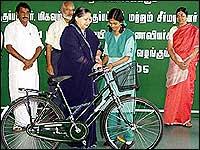Note: This was written immediately after the 2004 election results were announced for AP state assembly and prior to the announcement of the results of Parliamentary elections. It is just being published in this space now.
 Pollsters are taken aback. Arguably the most popular CM India has ever seen- is now drubbed to never expected levels.
Pollsters are taken aback. Arguably the most popular CM India has ever seen- is now drubbed to never expected levels.
Mind you, though everyone were predicting trouble for Naidu & allies, none were even remotely expecting this complete rout. NDTV indicated close finish between the TDP and Congress, and ditto by Aaj tak, Star News etc. But, this unprecedented defeat has yet again ridiculed the opinion & exit polls.
Now there will be analysis and opinions that will tell us, where and how Naidu went wrong. Already we started hearing some wiser men giving us reasons like 'Naidu made arbitrary decisions', 'Naidu never groomed second rung of leadership' and so on and so forth. I am sure, we will hear more of such pieces in the next couple of days to come. But, did we ever heard such negative views about Naidu in the media before. How did the media, trumpeted to be the soul of the common man failed to gauge the public mood?
We have earlier witnessed populist politicians, who initiate popular schemes that are badly ill-conceived and go against fiscal discipline. Congress' promise for free power for agriculture is one such thing. Also we have seen politicians, who would incite madness and frenzy among people for short term gains, as the likes of TRS that demands Telengana and the PMK (in TN) playing the caste game. But, Naidu was largely against any such approaches. So, how did he gained the level of popularity he has been enjoying? The answer lies in the charm with which Naidu mesmerized the media not only in India but world over. If other politicians are populist, he is certainly a marketing guru, who will put an IIM marketing grad to shame. His seamless ability to market himself as a new breed of politician earned him accolades, that is envied by others.
Anything he did, fetched him considerable column inches in national and regional newspapers alike. Every news/report/article about him was positive (till the opposition woke up to the election fever few months back); from his meeting with the Clinton, Gates and Theresa to his foreign visits for attracting investments in India. Many people from outside AP, even dreamt of having Chandrababu for their own state. Naidu was rated as one of the top chief ministers by India Today.
But, for a long time now, I have been skeptical about the Naidu's way of governance. The media toeing Naidu's line reminded me the 'American Press', where only positive things about the president appear in the press. Naidu's visit to Germany to bring the Formula-1 circuit to Hyderabad was a cruel joke. His visit happened, when several people were dying at the peak of the drought in AP. Sounds like a modern-day Nero (Supreme court equating Modi with Nero is altogether different story)!!
But, the press was not completely indifferent to the plight of Andhraites as can be seen from a series of artiles that appeared in The Hindu, by P Sainath an award winning journalist. In the series, Sainath extensively covers wide-ranging issues such as state of education, drought, poverty and malnourishment, unemployement and migration. Remember, all these articles were written in 2003, nearly 8 years after Naidu ascended the throne. Farmers were committing suicides due to poverty despite Naidu exerting much pressure on Vajpayee and getting the astronomical amounts of food grains and assistance for drought relief, when compared to any other state in India. So, what was he doing all these days?
Surely, Hyderabad has improved a lot with swanky roads, big multinationals, IT & Pharma companies, increased foreign investments etc. But, at what cost? Agriculture has been in doldrums and the consecutive drought for three years added to the severity. Highest number of suicide cases by farmers was from AP than in any other state. Migration was and continues to be at peak in Naidu's period compared to the others. Naidu was unabated. All these pointers clearly implies Naidu's complete lack of interest in anything, save IT & Pharma. He simply failed to ensure a comprehensive, holistic and integrated development of all sectors and all regions of the state. His vision of 'Swarna Andhra', proved to be a hollow slogan and probably should be rechristened 'Swarna Hyderabad'. And, it is natural that Naidu pays for that.
Tailpiece: If Naidu is a person adored by the press; his neighbour in the backyard Tamil Nadu, Jayalalithaa is a person, whom the press loves to hate. During the last state election in 2001, she pulled an astounding victory, despite being at odds with the entire media and the opposition. That time too, the predictions went wrong, and this time again, they predict nothing but defeat for her. And what's in store for her this time? Personally, I'll go with the pollsters. But, we'll get to know it in two days from now.


